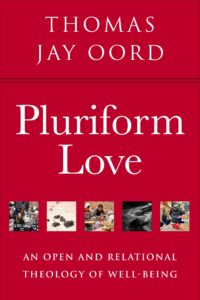Everlasting Creating and Love Winning
My friend Ryan Patrick McLaughlin sent good questions about my theology. I addressed a couple in a previous blog. In this essay, I address his question about God’s everlasting creating and eschatological fulfillment.
Ryan: “Your position on creation maintains that God has always been creating out of that which God has already created (because God *must* create as an outflow of God’s loving nature). This means that God has been creating for an eternity. At the same time, your position on eschatology maintains that it is possible (even plausible and reasonable, if I understand you correctly) to hold that God will bring about a decisive eschatological victory over (genuine) evil because God is working tirelessly toward this end. But there seems to be an odd contradiction here. God has already been working for an eternity to bring about a definitive eschatological victory over evil, and the current state of creation is the best God has been able to do with an eternity of noncoercive effort. So in what sense is it reasonable to assume that God will be able to succeed if God just has more *time*? (God’s already had an eternity without success).”
This is one of Ryan’s best questions. It highlights some differences between my views and other views of God on offer. Ryan correctly says that I believe God everlastingly creates. And he correctly notes that I think God may eventually persuade all creation to love, thereby overcoming evil. But Ryan wonders how optimistic I can be if God has already been everlastingly creating and yet evil is not currently overcome.
The Main Alternative
Before answering, let me note the main alternative to my view. That view says God has not been creating everlastingly and, should God in the future overcome evil through control, God would not create free creatures capable of sin thereafter.
The main alternative also implies that when God singlehandedly overcomes evil in the future, all creatures existing at that time would not be able to choose freely between good and evil. In other words, a future that guarantees the continual reign of love requires God to control creatures. And forever thereafter, God must not provide freedom to creatures.
Of course, the God with this alleged ability to control has not used been using that control consistently now. At least not decisively. After all, evil occurs often. This God could prevent all evil but is not doing so.
If creaturely love requires free choices, a God who controls in the future and guarantees the continual reign of love must remove the creaturely ability to choose love. In other words, the main alternative to my view has HUGE problems for making sense of love.
My View
I think God always loves, always creates, and never controls. Creatures always have the option to love freely or choose otherwise. God can’t guarantee an evil-free future by controlling creatures and forcing them to love. Love does not control.
But my view has the genuine hope that all creation will cooperate with God. After all, the uncontrolling love of God is relentlessly persuasive. God never gives up on anyone.
There’s also no reason to think that a perfect state of love did not happen in the past. After all, once all creation cooperates and love reigns, God continues to create free creatures. And those creatures may choose not to love. In fact, the idea of a perfect state of affairs followed by a fall of rebellion against God seems to be a story so many Christians affirm about rebellious angels.
The view I offer differs from other theologies. It doesn’t claim God has never been successful in persuading all free creatures to love. Nor does it claim God can’t be successful in persuading all free creatures in the future. It simply says a loving God never controls and creatures always have the freedom to love or not. And there’s the genuine hope that all creatures will cooperate with love.
I call this the “relentless love” view of the afterlife, and you can find my explanation in several books. Or see a summary in this blog. Although my view is uncommon, it follows the logic of God’s uncontrolling love.


Comments